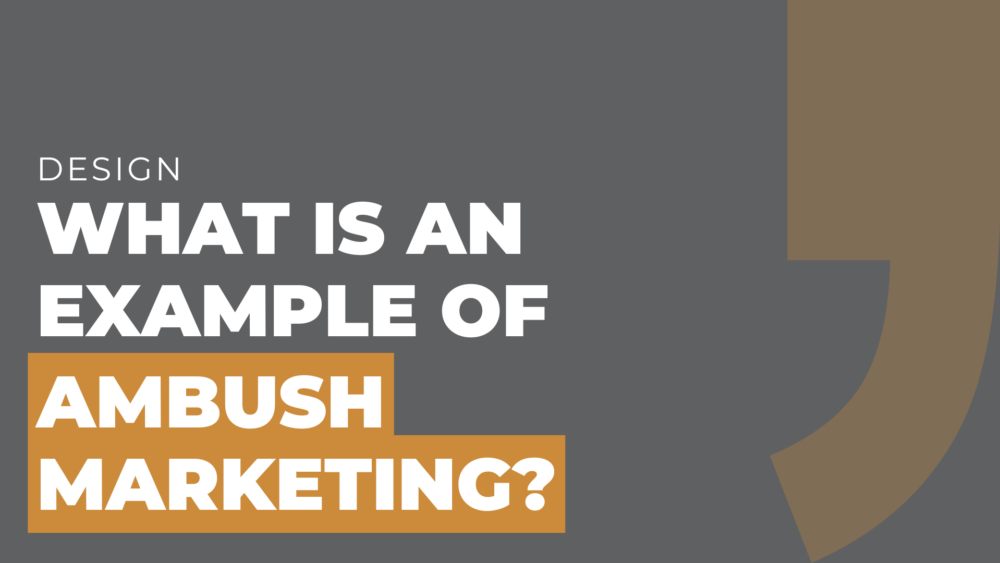In marketing, there are widely accepted strategies and controversial technique.
Ambush marketing is considered pretty controversial.
But what is it, and what is an example of ambush marketing?
Ambush marketing refers to a strategy where a brand capitalizes on the publicity of a major event without being an official sponsor.
An example would be during the 2010 FIFA World Cup, when Bavaria beer orchestrated a stunt involving 36 fans wearing orange miniskirts as a form of guerrilla advertising, despite not being an official FIFA sponsor.
Why was this ambush marketing?
Because FIFA had an exclusive deal with another beer brand, and Bavaria used this event to garner attention and promote their own brand without paying the sponsorship fee.
This type of marketing can be seen as clever and creative, but it also raises ethical concerns.
Let’s look a little more closely at the types of ambush marketing.
Types of Ambush Marketing
Ambush marketing refers to a strategy where a brand attempts to associate itself with an event or another brand without having an official sponsorship or partnership.
It aims to gain attention, exposure, and visibility by piggybacking on the popularity and goodwill of the targeted entity.
Here are some common types of ambush marketing:
Ambush by Association
This type occurs when a brand creates an advertisement or campaign that indirectly references a popular event or brand without explicitly mentioning it.
The intention is to create a connection in the minds of consumers, even though no formal association exists.
Direct Ambush
In direct ambush marketing, a brand directly competes with a sponsor by launching a campaign during or around a sponsored event.
The aim is to divert attention away from the official sponsors and redirect it to their own brand.
Predatory Ambushing
Predatory ambush marketing involves deliberately misleading consumers to believe that the ambusher is the official sponsor or has ties to the event.
This can be achieved through clever advertising tactics or creating confusion with similar branding elements.
Is Ambush Marketing Ethical?
The ethics of ambush marketing are widely debated.
Critics argue that it undermines the investments made by official sponsors and dilutes the value of sponsorship rights.
It can also mislead consumers and create confusion about which brands are genuinely associated with an event.
On the other hand, supporters argue that ambush marketing promotes healthy competition and creativity, allowing brands to find alternative and creative ways of gaining exposure.
Ultimately, the ethical implications of ambush marketing depend on various factors, including the intent, impact on consumers, and adherence to legal boundaries.
It is important for brands to carefully consider the consequences before engaging in such practices.
Recent (and Historic) Examples of Ambush Marketing
FIFA World Cup 2018
During the FIFA World Cup in Russia, Nike released an ad campaign featuring renowned players, despite not being an official sponsor.
The advertisements created a buzz and generated significant attention, overshadowing some of the official sponsors’ efforts.
Olympic Games
In the 2012 London Olympics, Beats by Dre, a headphone company, gifted their headphones to athletes, which led to many Olympic participants wearing their products during the games.
Although not an official sponsor, Beats by Dre managed to gain exposure and association with the prestigious event.
Cricket World Cup 1996
In a bold move of ambush marketing, Pepsi launched their “Nothing Official About It” campaign during the 1996 Cricket World Cup, challenging the official sponsorship of Coca-Cola.
This clever tactic allowed Pepsi to associate themselves with the popular event without having any official ties.
The campaign successfully created buzz and stole the spotlight from Coca-Cola, showcasing the power of ambush marketing in capturing attention and gaining visibility.
At the End of the Day
Ambush marketing is a controversial marketing technique that aims to capitalize on the popularity of events or brands without official sponsorship.
While it can be seen as an innovative and attention-grabbing strategy, its ethical implications and potential negative impact on official sponsors should be carefully considered.
By understanding the different types of ambush marketing and analyzing recent examples, brands can make informed decisions about their marketing strategies.


Comments are closed.